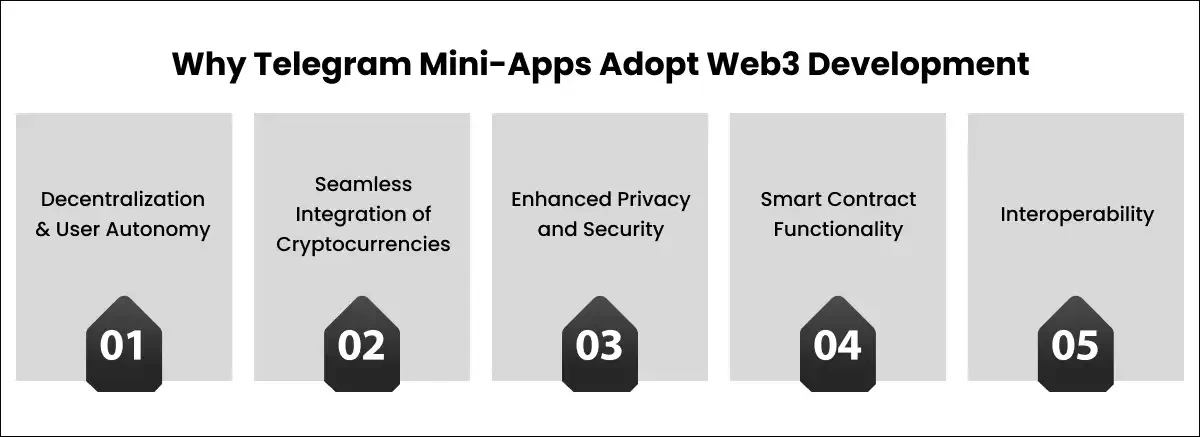Web3 development for Telegram mini-apps: Pros and Cons
Oct 4, 2024



Telegram, one of the world's most popular messaging platforms with over 700 million active users, is expanding its ecosystem by incorporating Web3 technology into its mini-apps. This shift towards decentralization is driven by the desire to provide enhanced privacy, security, and financial autonomy to users. As Web3 continues to grow, Telegram sees this as an opportunity to stay ahead of the curve by offering innovative, decentralized features that align with its core principles of user empowerment and security.
Web3 technology, built on blockchain, allows Telegram mini-apps to offer services like decentralized payments, smart contracts, and tokenized rewards systems. With the integration of cryptocurrencies and decentralized finance (DeFi) within the app, users can now send payments, access decentralized applications (dApps), and engage in financial activities without relying on traditional intermediaries. This seamless connection between communication and finance is transforming how users interact with the platform, making Telegram a leader in adopting Web3 development.
However, the transition to Web3 is challenging. While the decentralized nature of Web3 offers greater control and transparency, it also introduces complexities in user experience, regulatory concerns, and scalability issues. Despite these hurdles, the adoption of Web3 in Telegram’s mini-apps marks a significant step toward creating a more decentralized and user-driven internet, where users have greater control over their data and transactions.
Why Telegram Mini-Apps Adopt Web3 Development

Decentralization & User Autonomy: Web3 principles are built on decentralization, meaning no single entity controls the application. Telegram mini-apps can leverage blockchain to allow users more control over their data and transactions, ensuring transparency and autonomy.
Seamless Integration of Cryptocurrencies: Telegram mini-apps benefit from integrating cryptocurrency and blockchain-based payment systems. For example, the Telegram Open Network (TON) enables peer-to-peer transfers, micropayments, and decentralized finance (DeFi) applications directly within the app, facilitating global payments without intermediaries.
Enhanced Privacy and Security: Blockchain technology offers encryption and cryptographic security measures that make user data and transactions more secure. This aligns with Telegram’s commitment to privacy, where users seek secure communications and transactions.
Smart Contract Functionality: Web3 enables the use of smart contracts, allowing mini-apps to automate processes like payments, governance, and rewards systems. These contracts execute automatically when certain conditions are met, reducing the need for intermediaries and increasing efficiency.
Interoperability: With Web3 protocols, mini-apps can connect with various blockchains, creating interoperable ecosystems. This allows users to engage with different dApps (decentralized applications) from different platforms through Telegram without leaving the app.
Pros of Web3 Development in Telegram Mini-Apps
Increased User Trust: The decentralized and transparent nature of Web3 can build trust among users, especially those wary of centralized platforms that monetize data or control access.
Financial Inclusion: Through integrated blockchain systems, mini-apps can facilitate borderless transactions using cryptocurrencies, enabling users in underbanked regions to access financial services.
Censorship Resistance: Web3 applications are more resistant to censorship because they operate on decentralized networks. This is particularly attractive to Telegram, which has a large global user base in regions with restrictive internet regulations.
Reduced Fees: Blockchain eliminates the need for intermediaries in payment systems, which can result in lower transaction fees for users and businesses. Mini-apps can enable seamless, low-cost payments using decentralized currencies.
Token-Based Incentives: Web3 allows the creation of tokenized ecosystems. Telegram mini-apps can use tokens to incentivize user behaviour, such as rewarding users for content creation, participation, or engagement.
Cons of Web3 Development in Telegram Mini-Apps
User Experience Complexity: Web3 interfaces are not as intuitive as traditional Web2 applications. Users might find the learning curve steep, particularly when dealing with wallets, private keys, and decentralized applications.
Scalability Issues: Despite advancements, blockchain technology still faces scalability issues. High transaction costs and slow processing times can impact the performance of mini-apps, especially during periods of network congestion.
Regulatory Uncertainty: Web3 applications often operate in a grey legal area, particularly in terms of cryptocurrency use and tokenomics. This uncertainty can hinder the widespread adoption of Telegram mini-apps built on Web3, as different regions enforce different regulations.
Security Risks: While blockchain is known for its security, smart contracts can be vulnerable to bugs and exploits. Poorly designed contracts can lead to hacks or funds being irreversibly lost. Additionally, phishing attacks targeting wallets are common in the Web3 space.
Limited Adoption: Although Web3 is gaining traction, it is still in its early stages. Many users are unfamiliar with blockchain technologies, leading to limited mainstream adoption. This may affect the success of mini-apps that heavily rely on Web3 features.
Conclusion
The adoption of Web3 development by Telegram mini-apps represents a significant step forward in creating a decentralized, secure, and user-empowered platform. By integrating blockchain technology, cryptocurrencies, and decentralized finance, Telegram is enhancing its ecosystem to offer a seamless blend of communication and financial autonomy. While challenges like regulatory uncertainty and user experience complexity persist, the benefits of decentralization, such as increased privacy and reduced transaction fees, are driving the future of Telegram's mini-app landscape. As more users become comfortable with blockchain technology, Telegram's Web3-powered mini-apps will likely set a new standard for decentralized application ecosystems.
Decentrablock, a leader in real-world asset (RWA) tokenization services, is now developing cutting-edge Telegram mini-apps powered by Web3 technology. By leveraging blockchain, Decentrablock enables Telegram users to access new financial services, securely transact, and participate in decentralized ecosystems, driving the global adoption of Web3. These innovative mini-apps offer a secure and decentralized experience, helping businesses and individuals harness the potential of blockchain to transform their operations. Don’t miss the opportunity to be part of the Web3 revolution! Join us at Decentrablock and explore how our Telegram mini-apps can elevate your business and enhance your user experience. Contact us today to learn more about our solutions and how we can help you navigate the future of decentralized technology.
Telegram, one of the world's most popular messaging platforms with over 700 million active users, is expanding its ecosystem by incorporating Web3 technology into its mini-apps. This shift towards decentralization is driven by the desire to provide enhanced privacy, security, and financial autonomy to users. As Web3 continues to grow, Telegram sees this as an opportunity to stay ahead of the curve by offering innovative, decentralized features that align with its core principles of user empowerment and security.
Web3 technology, built on blockchain, allows Telegram mini-apps to offer services like decentralized payments, smart contracts, and tokenized rewards systems. With the integration of cryptocurrencies and decentralized finance (DeFi) within the app, users can now send payments, access decentralized applications (dApps), and engage in financial activities without relying on traditional intermediaries. This seamless connection between communication and finance is transforming how users interact with the platform, making Telegram a leader in adopting Web3 development.
However, the transition to Web3 is challenging. While the decentralized nature of Web3 offers greater control and transparency, it also introduces complexities in user experience, regulatory concerns, and scalability issues. Despite these hurdles, the adoption of Web3 in Telegram’s mini-apps marks a significant step toward creating a more decentralized and user-driven internet, where users have greater control over their data and transactions.
Why Telegram Mini-Apps Adopt Web3 Development

Decentralization & User Autonomy: Web3 principles are built on decentralization, meaning no single entity controls the application. Telegram mini-apps can leverage blockchain to allow users more control over their data and transactions, ensuring transparency and autonomy.
Seamless Integration of Cryptocurrencies: Telegram mini-apps benefit from integrating cryptocurrency and blockchain-based payment systems. For example, the Telegram Open Network (TON) enables peer-to-peer transfers, micropayments, and decentralized finance (DeFi) applications directly within the app, facilitating global payments without intermediaries.
Enhanced Privacy and Security: Blockchain technology offers encryption and cryptographic security measures that make user data and transactions more secure. This aligns with Telegram’s commitment to privacy, where users seek secure communications and transactions.
Smart Contract Functionality: Web3 enables the use of smart contracts, allowing mini-apps to automate processes like payments, governance, and rewards systems. These contracts execute automatically when certain conditions are met, reducing the need for intermediaries and increasing efficiency.
Interoperability: With Web3 protocols, mini-apps can connect with various blockchains, creating interoperable ecosystems. This allows users to engage with different dApps (decentralized applications) from different platforms through Telegram without leaving the app.
Pros of Web3 Development in Telegram Mini-Apps
Increased User Trust: The decentralized and transparent nature of Web3 can build trust among users, especially those wary of centralized platforms that monetize data or control access.
Financial Inclusion: Through integrated blockchain systems, mini-apps can facilitate borderless transactions using cryptocurrencies, enabling users in underbanked regions to access financial services.
Censorship Resistance: Web3 applications are more resistant to censorship because they operate on decentralized networks. This is particularly attractive to Telegram, which has a large global user base in regions with restrictive internet regulations.
Reduced Fees: Blockchain eliminates the need for intermediaries in payment systems, which can result in lower transaction fees for users and businesses. Mini-apps can enable seamless, low-cost payments using decentralized currencies.
Token-Based Incentives: Web3 allows the creation of tokenized ecosystems. Telegram mini-apps can use tokens to incentivize user behaviour, such as rewarding users for content creation, participation, or engagement.
Cons of Web3 Development in Telegram Mini-Apps
User Experience Complexity: Web3 interfaces are not as intuitive as traditional Web2 applications. Users might find the learning curve steep, particularly when dealing with wallets, private keys, and decentralized applications.
Scalability Issues: Despite advancements, blockchain technology still faces scalability issues. High transaction costs and slow processing times can impact the performance of mini-apps, especially during periods of network congestion.
Regulatory Uncertainty: Web3 applications often operate in a grey legal area, particularly in terms of cryptocurrency use and tokenomics. This uncertainty can hinder the widespread adoption of Telegram mini-apps built on Web3, as different regions enforce different regulations.
Security Risks: While blockchain is known for its security, smart contracts can be vulnerable to bugs and exploits. Poorly designed contracts can lead to hacks or funds being irreversibly lost. Additionally, phishing attacks targeting wallets are common in the Web3 space.
Limited Adoption: Although Web3 is gaining traction, it is still in its early stages. Many users are unfamiliar with blockchain technologies, leading to limited mainstream adoption. This may affect the success of mini-apps that heavily rely on Web3 features.
Conclusion
The adoption of Web3 development by Telegram mini-apps represents a significant step forward in creating a decentralized, secure, and user-empowered platform. By integrating blockchain technology, cryptocurrencies, and decentralized finance, Telegram is enhancing its ecosystem to offer a seamless blend of communication and financial autonomy. While challenges like regulatory uncertainty and user experience complexity persist, the benefits of decentralization, such as increased privacy and reduced transaction fees, are driving the future of Telegram's mini-app landscape. As more users become comfortable with blockchain technology, Telegram's Web3-powered mini-apps will likely set a new standard for decentralized application ecosystems.
Decentrablock, a leader in real-world asset (RWA) tokenization services, is now developing cutting-edge Telegram mini-apps powered by Web3 technology. By leveraging blockchain, Decentrablock enables Telegram users to access new financial services, securely transact, and participate in decentralized ecosystems, driving the global adoption of Web3. These innovative mini-apps offer a secure and decentralized experience, helping businesses and individuals harness the potential of blockchain to transform their operations. Don’t miss the opportunity to be part of the Web3 revolution! Join us at Decentrablock and explore how our Telegram mini-apps can elevate your business and enhance your user experience. Contact us today to learn more about our solutions and how we can help you navigate the future of decentralized technology.
Telegram, one of the world's most popular messaging platforms with over 700 million active users, is expanding its ecosystem by incorporating Web3 technology into its mini-apps. This shift towards decentralization is driven by the desire to provide enhanced privacy, security, and financial autonomy to users. As Web3 continues to grow, Telegram sees this as an opportunity to stay ahead of the curve by offering innovative, decentralized features that align with its core principles of user empowerment and security.
Web3 technology, built on blockchain, allows Telegram mini-apps to offer services like decentralized payments, smart contracts, and tokenized rewards systems. With the integration of cryptocurrencies and decentralized finance (DeFi) within the app, users can now send payments, access decentralized applications (dApps), and engage in financial activities without relying on traditional intermediaries. This seamless connection between communication and finance is transforming how users interact with the platform, making Telegram a leader in adopting Web3 development.
However, the transition to Web3 is challenging. While the decentralized nature of Web3 offers greater control and transparency, it also introduces complexities in user experience, regulatory concerns, and scalability issues. Despite these hurdles, the adoption of Web3 in Telegram’s mini-apps marks a significant step toward creating a more decentralized and user-driven internet, where users have greater control over their data and transactions.
Why Telegram Mini-Apps Adopt Web3 Development

Decentralization & User Autonomy: Web3 principles are built on decentralization, meaning no single entity controls the application. Telegram mini-apps can leverage blockchain to allow users more control over their data and transactions, ensuring transparency and autonomy.
Seamless Integration of Cryptocurrencies: Telegram mini-apps benefit from integrating cryptocurrency and blockchain-based payment systems. For example, the Telegram Open Network (TON) enables peer-to-peer transfers, micropayments, and decentralized finance (DeFi) applications directly within the app, facilitating global payments without intermediaries.
Enhanced Privacy and Security: Blockchain technology offers encryption and cryptographic security measures that make user data and transactions more secure. This aligns with Telegram’s commitment to privacy, where users seek secure communications and transactions.
Smart Contract Functionality: Web3 enables the use of smart contracts, allowing mini-apps to automate processes like payments, governance, and rewards systems. These contracts execute automatically when certain conditions are met, reducing the need for intermediaries and increasing efficiency.
Interoperability: With Web3 protocols, mini-apps can connect with various blockchains, creating interoperable ecosystems. This allows users to engage with different dApps (decentralized applications) from different platforms through Telegram without leaving the app.
Pros of Web3 Development in Telegram Mini-Apps
Increased User Trust: The decentralized and transparent nature of Web3 can build trust among users, especially those wary of centralized platforms that monetize data or control access.
Financial Inclusion: Through integrated blockchain systems, mini-apps can facilitate borderless transactions using cryptocurrencies, enabling users in underbanked regions to access financial services.
Censorship Resistance: Web3 applications are more resistant to censorship because they operate on decentralized networks. This is particularly attractive to Telegram, which has a large global user base in regions with restrictive internet regulations.
Reduced Fees: Blockchain eliminates the need for intermediaries in payment systems, which can result in lower transaction fees for users and businesses. Mini-apps can enable seamless, low-cost payments using decentralized currencies.
Token-Based Incentives: Web3 allows the creation of tokenized ecosystems. Telegram mini-apps can use tokens to incentivize user behaviour, such as rewarding users for content creation, participation, or engagement.
Cons of Web3 Development in Telegram Mini-Apps
User Experience Complexity: Web3 interfaces are not as intuitive as traditional Web2 applications. Users might find the learning curve steep, particularly when dealing with wallets, private keys, and decentralized applications.
Scalability Issues: Despite advancements, blockchain technology still faces scalability issues. High transaction costs and slow processing times can impact the performance of mini-apps, especially during periods of network congestion.
Regulatory Uncertainty: Web3 applications often operate in a grey legal area, particularly in terms of cryptocurrency use and tokenomics. This uncertainty can hinder the widespread adoption of Telegram mini-apps built on Web3, as different regions enforce different regulations.
Security Risks: While blockchain is known for its security, smart contracts can be vulnerable to bugs and exploits. Poorly designed contracts can lead to hacks or funds being irreversibly lost. Additionally, phishing attacks targeting wallets are common in the Web3 space.
Limited Adoption: Although Web3 is gaining traction, it is still in its early stages. Many users are unfamiliar with blockchain technologies, leading to limited mainstream adoption. This may affect the success of mini-apps that heavily rely on Web3 features.
Conclusion
The adoption of Web3 development by Telegram mini-apps represents a significant step forward in creating a decentralized, secure, and user-empowered platform. By integrating blockchain technology, cryptocurrencies, and decentralized finance, Telegram is enhancing its ecosystem to offer a seamless blend of communication and financial autonomy. While challenges like regulatory uncertainty and user experience complexity persist, the benefits of decentralization, such as increased privacy and reduced transaction fees, are driving the future of Telegram's mini-app landscape. As more users become comfortable with blockchain technology, Telegram's Web3-powered mini-apps will likely set a new standard for decentralized application ecosystems.
Decentrablock, a leader in real-world asset (RWA) tokenization services, is now developing cutting-edge Telegram mini-apps powered by Web3 technology. By leveraging blockchain, Decentrablock enables Telegram users to access new financial services, securely transact, and participate in decentralized ecosystems, driving the global adoption of Web3. These innovative mini-apps offer a secure and decentralized experience, helping businesses and individuals harness the potential of blockchain to transform their operations. Don’t miss the opportunity to be part of the Web3 revolution! Join us at Decentrablock and explore how our Telegram mini-apps can elevate your business and enhance your user experience. Contact us today to learn more about our solutions and how we can help you navigate the future of decentralized technology.

DecentraBlock is at the forefront of blockchain innovation, revolutionizing how businesses secure, transact, and grow in the digital age. Join us on a journey to harness the full potential of decentralized technology for a more efficient and transparent future.
Services
Subscribe to Our Newsletter
Get the latest news, updates, and insights on blockchain technology directly to your inbox. Sign up for our newsletter today!
© 2024 DecentraBlock. All rights reserved.

DecentraBlock is at the forefront of blockchain innovation, revolutionizing how businesses secure, transact, and grow in the digital age. Join us on a journey to harness the full potential of decentralized technology for a more efficient and transparent future.
Services
Subscribe to Our Newsletter
Get the latest news, updates, and insights on blockchain technology directly to your inbox. Sign up for our newsletter today!
© 2024 DecentraBlock. All rights reserved.

DecentraBlock is at the forefront of blockchain innovation, revolutionizing how businesses secure, transact, and grow in the digital age. Join us on a journey to harness the full potential of decentralized technology for a more efficient and transparent future.
Services
Subscribe to Our Newsletter
Get the latest news, updates, and insights on blockchain technology directly to your inbox. Sign up for our newsletter today!
© 2024 DecentraBlock. All rights reserved.


